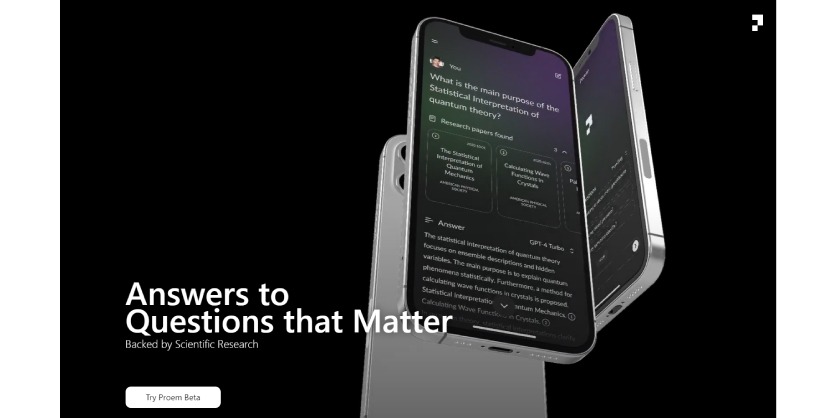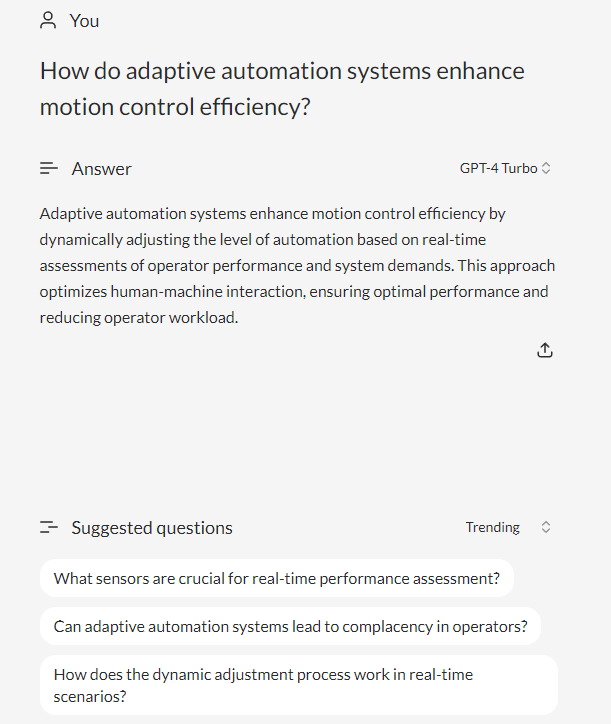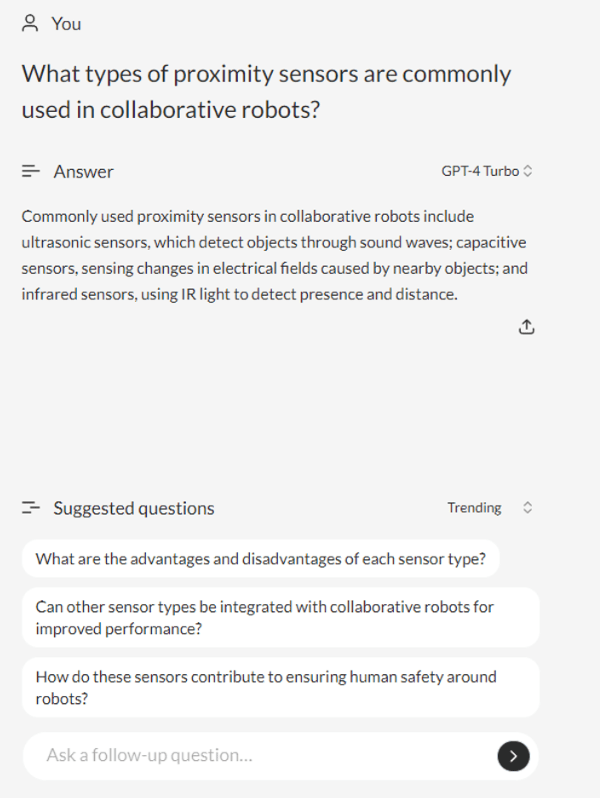Proemial Answers Your Queries with Scientific Backing
May 24, 2024

Proemial, a newly launched platform that answers your queries with scientific backing, is available as a beta version for anyone to use, for any question you have
By Krystie Johnston
Proemial is a startup company supported by gurus of the world’s leading tech organizations such as Apple, Amazon, and Meta. Their first product, proem, is a free, open platform that allows users to query any topic and dive deeper into it by exploring an extensive (and still growing) database of scientific papers. proem is designed to help users get a better understanding of their topic of interest with support from researchers, scientists, and experts in their field, using information that is credible and reliable.
In this article, Geet Khosla, serial tech entrepreneur, discusses how proem originated, what it is capable of, and its prospects for growth. Khosla and his co-founders Mads Rydahl, first Head of Product Design at Siri, and Brian Pedersen, tech veteran, began Proemial in 2023. Khosla has been building startups for almost 20 years; and has had four tech startups and two exits. Khosla’s inspiration for Proemial came from his experience in tech, his passion for innovation, and his drive to solve global problems.
Building a platform that attracts 100X more attention to research papers, the researchers, authors and others connected to the underlying breakthroughs
“For the last eight years, since my last exit [in the influencer market industry], I’ve been focused on helping companies and early-stage entrepreneurs in the deep tech or science tech sectors who want to build companies and take their ideas out of the labs and into the real world.”
Khosla saw some similar issues in the realm of science and technology that affected the influencer market industry in the early days, but at a much bigger level. He points out the landmark research paper from 2017, Attention is All You Need, co-authored by eight scientists working at Google, was a transformational paper that changed the way we use large language models (LLMs) and generative artificial intelligence (GenAI).
“Researchers spend their lives doing important work, writing papers on very niche topics that end up having big impacts. You don’t know which paper is going to impact the world. I think the power of research is so underappreciated. That was kind of what hit me in the face.”

Khosla explored this topic for several years, speaking with more than 800 hundred scientists and came to the same conclusion, time and again: research being underappreciated. And I just said, ‘Okay. There has to be a better way. We have to find a way to get people to actually understand the research.’”
Khosla’s realized the time was right for a platform that could help this research be better appreciated, and on the flip side, help users with questions connect to credible, reliable information. With his experience in deep tech and his visionary understanding of the future for generative AI models like GPT chat, he could see their potential to use them in products and to build products with them.
He admits that the founding of Proemial and the creation of proem was a combination of his vision, capable partners, and timing.
“I can’t state this enough. I think it’s also the serendipity and the timing of meeting Mads Rydahl, because, I had an idea, but I had to find people who could actually build it at the level where, in a town in Denmark, we can compete with a company in San Francisco and not be worried much about talent, because Mads has done this at the highest level for many years.
He has a great network here and we found some amazing talent. It is a real partnership between me and Mads and Brian [Pedersen] and is why this can actually become something that is not just in my head.”
proem, an introduction, preface or preamble
The beta version of proem was launched on April 29, 2024. Users are invited to test the beta version and provide feedback. Khosla and his team will use the suggestions and comments from users to enhance the platform. proem has access to nearly 300 million scientific papers; and more than 400,000 new research papers are being added every month. The platform runs a query through this database and provides users with the most closely related answer to their question, with references to research.

When you try proem, you will see a short list of topics that are trending, and a space to ask your own question to the platform. Once you pose a question, you will see the platform analyzing the question and constructing an answer. It presents an answer, five related research papers with date and title, and three suggested questions based on the topic. Users can either visit a paper of interest or further query the platform.
“That is one of our design choices, not to give you long answers that ramble like a lot of the other model providers do. We want to give you the most concise answers so you can dive into the follow-up questions. We really care about follow-ups; we want you to dive deeper into the topic. We have ‘Trending Right Now’ and are working on other types of follow-up questions because we want you to grapple with the issue. We don’t want to just give you an answer, we want you to understand the issue further,” explains Khosla.
proem is not trying to provide an answer that is black or white, right or wrong, he adds. It is designed to get you to understand what the paper is about so you can dive a little deeper. Future versions of the platform could include follow-up questions that oppose the answer, and author profiles or even connecting them to the platform to encourage discourse. Another potential step would be to create a Pro-version, where users can access the high-level details of a paper of interest or create groups that can collaborate using the platform.
proem’s mission is to democratize scientific insights
Khosla and his team envision proem to be a flexible platform where everyone can have access to reputable, reliable information, and researchers can share their knowledge and insights. People who need to reference papers for university, or employees working in technical or scientific fields will benefit from this free platform. Anyone who wants to go beyond a website or social media platform can use proem to get information with a level of trust and guarantee. Khosla sees proem as being perfectly aligned for the producer and consumer of scientific information.
“In research, the incentives of producing research are well aligned, because most of the time, research is produced with taxpayers’ money, and grants, and foundations. So, the incentives to produce research are there. And most of the time, research is meant to be publicly available. Our incentives are perfectly aligned, we want to get attention to the work that is already available for free. It will always be free because of the way the incentive is set up,” says Khosla.
proem is unique in the way that it presents its recommendations. Khosla admits that his co-founders bring talents and capabilities to the platform that make it exceptional. For example, Mads Rydahl has been building recommender system algorithms for a very long time and knows recommender systems better than most people in the world. This experience allows proem to operate on what is known as a ‘breadth first’ approach. And proem’s quality specifications require that papers have at least 10 citations to ensure a base level of quality.

“proem’s incentives are not aligned with ads. We do not need to show you the most popular thing. We want to try and show you the right thing, based on your query. And what we are trying to do is give the new set of knowledge – or old set of knowledge – that has simple nuances a better chance of being discovered,” says Khosla.
Khosla shares a personal experience of using proem to ask if cold plunges are healthy and was intrigued to find a paper from 1929 among the top five articles that populated automatically. “It was written by collaboration with the Norwegian University and the University in somewhere in the US and I was just exciting that there was the paper that existed a long time, 100 years ago almost. There are a lot of interesting things we see, and I think that this is what is novel about our product,” he says.
proem will continue to evolve as its user base grows and affects the platform. Khosla was excited to share it with beta users and looks forward to seeing how they use the platform.
“It has been a really exciting last couple of months. We have gained confidence in what we can do as a small team, and now we want to show some of the big players that we are here to play. And try and get as many uses as we can through the product. Again, it is not about user growth right now, it is about learning. It is about seeing how people use it in interesting ways, how people break it in interesting ways, and how it does well,” says Khosla.
Anyone can try the proem beta version for free. Find out more about it here.
More Information
Related Story
Siri’s First Head of Product and Design Launches a New AI Startup Combating Misinformation
Siri’s first Head of Product and Design, Mads Rydahl, has funneled his extensive knowledge of AI and Large Language Models (LLMs) into a new company; Proemial. The startup, co-founded by serial entrepreneur Geet Khosla and tech veteran Brian Pedersen, tackles the most significant problem of accessing credible knowledge through search engines and AI-tools:






